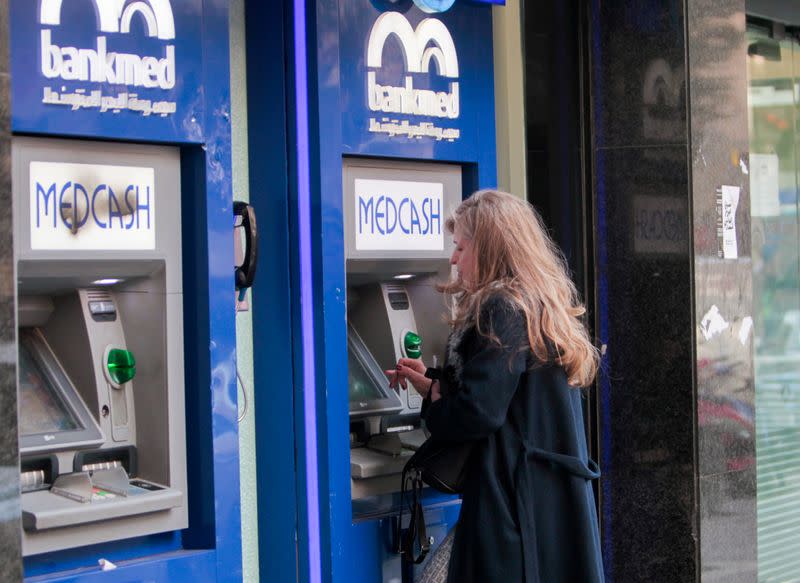Demeaned and no dollars - Lebanese choked by bank controls
By Ellen Francis
BEIRUT (Reuters) - Outside a bank in Lebanon's capital, dozens of people line up every morning long before the doors open, hoping to extricate whatever little cash the limits allow this week.
An employee announces only 15 people can get $100, everybody else must leave. Another morning, he says the branch has no dollars today.
"How can this be? A bank that has no money," said Pauline Sawma, 28, bursting into laughter after she tried withdrawing a sliver of her money.
"I've been here since 7 a.m. Can you imagine? Standing outside and waiting, so that maybe they give me $200 and maybe not," she said. "You can't buy anything, you can't travel. My microwave is broken, I can't even get it fixed."
Lebanon's financial crisis has made dollars scarce, hiked prices, slashed jobs and fuelled unrest. Cash-strapped banks have come under fire for imposing controls after years of funnelling deposits to a dysfunctional state drowning in debt.
The controls, which kicked in four months ago without legislation, vary from one bank to another, giving some discretion to branches to decide who gets what. Banks have curbed withdrawals to as little as $100 a week, blocked transfers abroad and cut card spending online or abroad.
At least a dozen depositors told Reuters the curbs got stricter every few weeks and often did not apply to everyone in the same way. Some said their branches did not always have cash to meet even the measly limits.
Others said bankers had threatened to close accounts of customers who tried complaining. Bank workers say they, too, have faced growing pressure from irate depositors.
PATIENCE RUNNING THIN
The banking association could not be reached for comment. Its chairman has said the rules seek to preserve Lebanon's wealth inside the country and that banks have sustained big losses to secure hard currency.
With patience running thin, the government has vowed to draft a law standardising the controls, and on Tuesday, a public prosecutor met bankers to agree a set of rules.
At two of Lebanon's biggest banks, at least a dozen customers said they could no longer withdraw U.S. dollars that had gone into their accounts as of January. They must take out the funds in Lebanese pounds at the official peg, wiping more than 40% off the value relative to the market.
"They think it's okay to humiliate people and we don't have the right to complain. It's as if we're garbage," said Sawma, who works at a beauty parlour where she took a pay cut.
When she objected about queues, she says the manager berated her. "It's not their fault, the bank employees. God help them," she added. "But at least respect us. Now they're being demeaned, we're being demeaned, and the politicians live in la-la-land."
Abdelhassan Husseini, a college professor in his 60s, spent 20 years saving for his kids. Now his architect son needs the funds to move abroad -- like many young Lebanese graduates -- the bank won't issue the U.S. dollars, not even in a cheque. The bank had offered him a Lebanese pound cheque instead, he said.
"It's utter humiliation. This is our money," he added, stalking out of his branch. "One day they give you $100, another day $50. Next they're going to start taking cash from you."
In his speech declaring Lebanon could not repay its debts, Prime Minister Hassan Diab pledged at the weekend to protect deposits. Still, such reassurances in recent months have done little to stop Lebanese from stashing cash at home.
After witnessing the 1975-1990 civil war and moving abroad with her husband to make a living, Hiyam al-Shami returned to spend her 60s in Lebanon. Now their savings are trapped in the bank and their kids have emigrated.
"It's a shame, at my age, to be demeaned like this," she said. "I wanted to live a bit here in Beirut, to see my siblings, to go out...God help us with these rulers. I hope none of them remain, not a single one."
(Writing by Ellen Francis, Editing by William Maclean)

 Yahoo Finance
Yahoo Finance 


